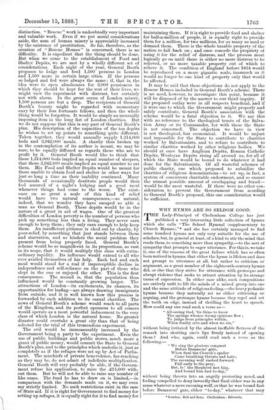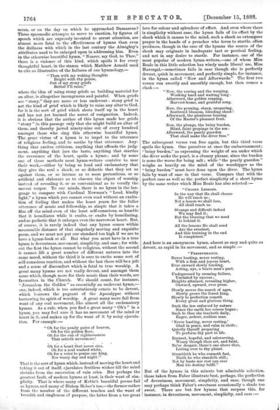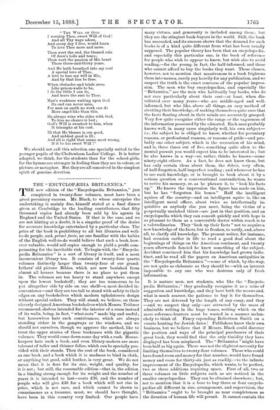WHY HYMNS ARE SO SELDOM GOOD.
THELady-Principal of Cheltenham College has just published a very interesting little collection of hymns which she calls " The School Hymnal (supplementary to Church Hymns),"* and she has certainly managed to find some hundred hymns not only very suitable for the use of
scholars, but, in general at least, of a kind to stir the mind that reads them, to something more than sympathy,—to the sort of sympathy that prompts to eager utterance. For this is, we take it, one of the reasons of the great failure which has so often been noticed in hymns, that either the hymn is lifeless and does not prompt to utterance at all, but rather to criticism or argument, as a great number of the eighteenth-century hymns did, or else that they strive for utterance with grotesque and abrupt violence that seeks to attract attention by its strange turns of expression. In either case alike, such compositions are entirely unfit to lift the minds of a mixed group into one and the same attitude of religious feeling,—the heavy pedantic hymns because they naturally set us either criticising or arguing, and the grotesque hymns because they repel and set the teeth on edge, instead of thrilling the heart to speech.
How could any one read such a verse as-
" All-seeing God, 'tie thine to know The springs whence wrong opinions flow ; To judge from principles within, When frailty errs and when we sin,"
without being irritated by the almost ineffable flatness of the remark into shutting one's lips firmly instead of opening them ? And who, again, could read such a verse as the
following,- " We sing the glorious conquest Before Damascus' gate,
When Saul the Church's spoiler Came breathing threats and hate ; The ravening wolf rushed forward Full early to the prey, But, lo ! the Shepherd met him, And bound him fast to-day,"
without being thrown into an angrily protesting mood, and feeling compelled to deny inwardly that Saul either was in any
sense whatever a mere ravening wolf, or that he was bound fast before Damascus' gate, either " to-day," whatever that may
• London : Bell and Bona. Cheltenham: Edwards.
mean, or on the day bn which he approached Damascus ? These spasmodic attempts to move to emotion, by figures of speech which are expressly invented to arrest attention, are almost more fatal to the effectiveness of hymns than even the dullness with which in the last century the Almighty's
attributes used to be enlarged upon in addressing him. Even in the otherwise beautiful hymn, " Nearer, my God, to Thee," there is a violence of this kind, which spoils it for every thoughtful heart, in the stanza which Matthew Arnold used to cite as illustrative of the failures of our hymnology,- " Then with my waking thoughts
Bright with thy praise, Out of my stony griefs Bethel I'll raise,"
where the idea of using stony griefs as building material for an altar, is altogether incongruous and painful. When griefs are " stony," they are more or less undevout : stony grief is
not the kind of grief which is likely to raise any altar to God, for it is the sort of grief which shuts itself up in the heart and has not yet learned the secret of resignation. Indeed, it is obvious that the author of this hymn made her griefs " stony " in this passage only that she might build an altar of them, and thereby jarred ninety-nine out of every hundred amongst those who sing this otherwise beautiful hymn. 'The great virtue of a hymn is to impel to the utterance of religious feeling, and to soothe by that utterance. Any- thing that excites criticism, anything that offends the judg- ment, anything that jars the taste, anything that startles the reverence of the heart, spoils a hymn ; and by some one of these methods most hymn-writers contrive to mar their work,—either by being so loud and exclamatory that they give the soul a shock, or so didactic that they set us against them, or so intense as to seem pretentious, or so artificial and elaborate as to obscure the object of worship instead of revealing it, or so conventional as to versify the merest torpor. To our minds, there is no hymn in the lan- guage to compare with Cardinal Newman's " Lead, kindly light," a hymn which you cannot even read without an exalta- tion of feeling that makes the heart yearn for the fuller utterance of music and fellowship, so simple that it takes a film off the mind even of the least self-conscious, so humble that it humiliates while it exalts, or exalts by humiliating, and so pathetic that it enlarges even the narrowest heart. But, of course; it is rarely indeed that any hymn comes within measurable distance of that singularly moving and exquisite poem, and we must not put our standard too high if we are to have a hymn-book at all. But what you must have in a true hymn is devoutness, movement, simplicity, and ease ; for with- out the first the hymn cannot be religious, without the second it cannot lift a great number of different natures into the :same mood, without the third it is sure to excite some sort of self-conscious reaction, and without the last there will be a jolt and a sense of discomfort which is fatal to true worship. A great many hymns are not really devout, and amongst them some which, though more for their music than their words, are favourites in the Church. We should count, for instance, " Jerusalem the Golden " as essentially an undevout hymn,— one, indeed, which is too ostentatiously ornate to be devout, which borrows the pageant of the Apocalypse without borrowing its spirit of worship. A great many more fail from want of any real movement, like almost all the exclamatory hymns. As a rule, when you find a great many " Oh's " in a hymn, you may feel sure it has no movement of the mind or heart in it, and makes up for the want of it by noisy ejacula- tion. For example :- " Oh for the pearly gates of heaven, Oh for the golden floor, Oh for the sun of righteousness That setteth nevermore!
Oh for a heart that never sins, Oh for a soul washed white, Oh for a voiceto praise our king, Nor weary day and night 1"
That is the sort of hymn which, instead of moving the heart and taking it out of itself, ejaculates fruitless wishes till the mind
shrinks from the succession of vain cries. But perhaps the
greatest fault, of modern hymns at least, is their want of sim- plicity. That is where many of Keble's beautiful poems fail
as hymns, and many of Bishop Heber's too,—the former rather from the number of the different touches and the want of breadth and singleness of purpose, the latter from a too great love for colour and splendour of effect. And even where there is simplicity without ease, the hymn fails of its effect by the shock which it causes to the mind, such a shock as extempore prayer in the hands of a preacher who loves to startle, often produces, though in the case of the hymns the source of the shock may originate in inadequate tact or poetical feeling, and not in any desire to startle. For instance, one of the most popular of modern hymn-writers,—one of whom Miss Beale in this little selection has wisely made liberal use, Miss Havergal,—sometimes fails in ease though she is perfectly devout, quick in movement, and perfectly simple, for instance, in the hymn called " Now and Afterwards." The first two verses run sweetly and smoothly enough, but then comes a clash :- "Now, the sowing and the weeping, Working hard and waiting long : Afterward, the golden reaping, Harvest-home, and grateful song.
Now, the pruning, sharp, unsparing, Scattered blossom, bleeding shoot ! Afterward, the plenteous bearing Of the Master's pleasant fruit.
Now, the plunge, the briny burden, Blind, faint gropings in the sea : Afterward, the pearly guerdon That shall make the diver free."
The subsequent verses run free again, but this third verse spoils the hymn. One perceives at once the embarrassment; " briny burden," as expressing the weight of sea under which the diver seeks the pearl, is a clumsy phrase, since the burden is none the worse for being salt ; while "the pearly guerdon" weighs as heavily on the mind of the worshipper as the
" briny burden " must have done upon the diver. The hymn fails by want of ease in that verse. Compare that with the perfect ease as well as the perfect simplicity of a short hymn by the same writer which Miss Beale has also selected :- " Cnossw LEssoNs.
In the way that He shall choose
He will teach us ;
Not a lesson we shall lose,
All shall reach us.
Strange and difficult indeed We may find it; But the blessing that we need Is behind it.
All the lessons He shall send Are the sweetest, And this training in the end Is completest."
And here is an anonymous hymn, almost as easy and quite as devout, as rapid in its movement, and as simple :— "PERSEVERANCE.
Never hasting, never resting,
With a firm and joyous heart, Ever onward slowly tending, Acting, aye, a brave man's part.
Undepressed by seeming failure, Unelated by success ; Heights attained, revealing higher, Onward, upward, ever press.
Slowly moves the march of ages, Slowly grows the forest king, Slowly to perfection cometh Every great and glorious thing.
Such the law enforced by nature Since the earth her course began ; Such to thee she teacheth daily, Eager, ardent, restless man.
`Never Misting, never resting,' Glad in peace, and calm in strife ; Quietly thyself preparing To perform thy part in life.
Earnest, hopeful, and unswerving, Weary though thou art, and faint, Ne'er despair, there's one above thee, Listing ever to thy plaint.
Stumbleth he who runneth fast, Dieth he who standeth still; Not by haste nor rest can ever Man his destiny fulfil."
But of the hymns in this minute but admirable selection, those taken from Faber illustrate best, perhaps, the perfection of devoutness, movement, simplicity, and ease, though one may perhaps think Faber's sweetness occasionally a shade too sweet. There are but few hymns that surpass this, for instance, in devoutness, movement, simplicity, and ease :—
" THE WILL OF GOD.
I worship Thee, sweet Will of God ! And all Thy ways adore, And every day I live, would learn To love Thee more and more.
Thou wert the end, the blessed rule Of Jesu's toils and tears ; Thou wert the passion of His heart Those three-and-thirty years.
And He hath breathed into my soul A special love of Thee, A love to lose my will in His, And by that loss be free.
When obstacles and trials seem Like prison-walls to be, I do the little I can do, And leave the rest to Thee.
Man's weakness waiting upon God Its end can never miss, For men on earth no work can do More angel-like than this.
He always wins who sides with God, To him no chance is lost ; God's Will is sweetest to him, when It triumphs at his cost.
Ill that He blesses is our good, And unblest good is ill ; And all is right that seems most wrong, If it be his sweet Will !"
We should not call this selection one specially suited to the younger pupils of the Cheltenham Ladies' College. It is better adapted, we think, for the students than for the school-girls, for the hymns are stronger in feeling than they are in colour, or picture, or metaphor. But they are all conceived in the simplest spirit of genuine devotion.
















































 Previous page
Previous page